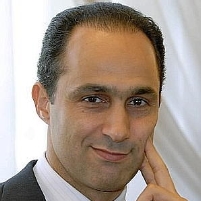As Egypt Investigates Mubarak Regime Corruption, the Trail Leads Back to the U.S.
Friday, October 21, 2011
 Gamal Mubarak
Gamal Mubarak
With a $10 million investment from the United States, the government of Egypt managed to lose $90 billion in potential revenues, thanks to high-level corruption by those connected to former dictator Hosni Mubarak.
In the early 1990s, the U.S. Agency for International Development gave Egypt $10 million to establish The Egyptian Center for Economic Studies (ECES). Its goal was to encourage the government to privatize Egyptian holdings, a strategy that was supposed to boost the treasury by $100 billion.
Instead, the country earned a tenth of that.
The problem was that many of those buying up Egyptian companies and resources were allies of the president’s son, Gamal Mubarak, who now sits in jail awaiting trial on corruption charges, along with four others who were involved with the ECES.
The younger Mubarak graduated from the American University of Cairo and worked as an investment banker for Bank of America. Gamal and his older brother, Alaa, founded Medinwest, which gained huge windfalls by buying and selling debt. After Egypt initiated a program to privatize hundreds of state companies, Gamal co-founded the ECES. The law firm of Baker $ McKenzie, based in Chicago, handled $3 billion worth of the Egyptian government’s sale of companies, land and other assets.
“It became a crony capitalism,” Magda Kandil, the think tank’s new executive director, told The Washington Post regarding the privatization program.
Even before the Mubarak regime collapsed, U.S. officials knew the privatization efforts carried risks.
A December 20, 2006, State Department cable published by WikiLeaks had the subject line “Graft, Bribes and Sweetheart Deals: The Rise (and Fall?) of Corruption in Egypt.” It quoted Hitler Tantawi, a former chief of an internal government financial watchdog called the Administrative Control Authority, as saying: “The privatization and economic opening of recent years have created new opportunities for ‘vertical corruption’ at upper levels of government affecting state resources.”
-Noel Brinkerhoff, David Wallechinsky
In Egypt, Corruption Cases Had an American Root (by James V. Grimaldi and Robert O’Harrow Jr., Washington Post)
- Top Stories
- Unusual News
- Where is the Money Going?
- Controversies
- U.S. and the World
- Appointments and Resignations
- Latest News
- Trump to Stop Deportations If…
- Trump Denounces World Series
- What If China Invaded the United States?
- Donald Trump Has a Mental Health Problem and It Has a Name
- Trump Goes on Renaming Frenzy






Comments